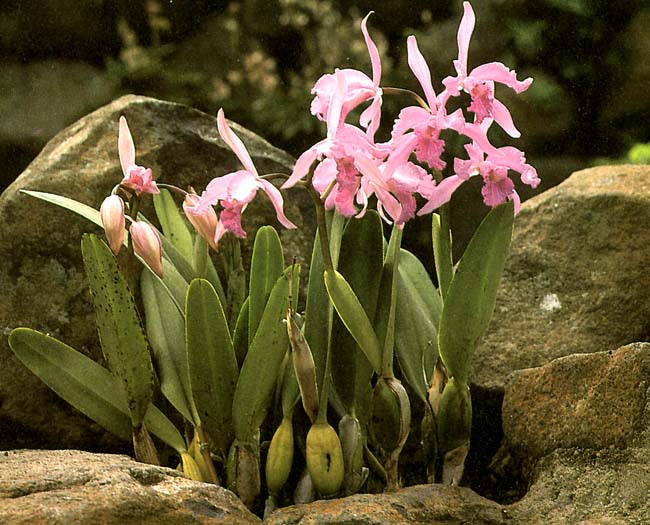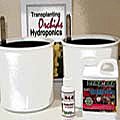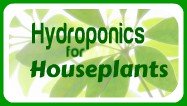Orchid Care -
Fertilizer for Orchids
In nature, orchids grow on rocks and trees. They get by on a slim diet of organic matter that collects at their roots from the wind and rain. This can be anything from decaying tree bark to bird droppings.
 Cattleya orchids growing in rocks - no potting soil here!
Cattleya orchids growing in rocks - no potting soil here!Live bacteria, enzymes, and microbes break down this organic matter into a form the plant can use.
This process is almost impossible growing at home with potted plants. Potting materials are sterilized, killing the bacteria, enzymes, and microbes needed to transform organic matter into a form your plants can use. So, potted plants rely on you, the grower, to provide the nutritional elements.
Plant Food or Plant Fertilizer?
Don't confuse "plant food" with "plant fertilizer. Plants manufacture their own "food" using a process called photosynthesis. With the power of the sun, they combine air, light, and water to make carbohydrates, which is the real food they use for growth.
"Plant ferilizer (or nutrients)", on the other hand, are mineral elements collected by the roots to enhance photosynthesis. Plant fertilizer (or nutrients) cannot compensate for the lack of real food plants need for growth (air, light, and water).
|
If your plants aren't getting the real food they use for growth - air, light, and water - your choice of fertilizer won't matter. |
 Air Air |
 Light Light |
 Water Water |
Comparing Orchids and Houseplants
In nature, houseplants live on the forest floor where their roots grow in a combination of soil, decaying leaves, and animal droppings. They choose their nutrients from an "all you can eat" smorgasboard of mineral elements.
Orchids, on the other hand absorb their nutrients high up in the trees. The water and nutrients they get can be sparse but they're cleaner and more pure than the water and nutrients houseplants find on the forest floor.
|
Orchids are naturally more finicky than houseplants about what fertilizer (or nutrients) they get. |
What About Organic Fertilizers?
Organic means "the nutrient contained in the product is derived solely from the remains of once living organisms". This includes animal wastes, crop residues, compost and numerous other byproducts.
Organic fertilizers sound good but most are incomplete in their nutritional value. They contain only one or two nutritional elements so blending different products is necessary. The result is uncontrollable, difficult to measure, and usually carries an odor. You never really know what your plants are getting.
Earthworm castings, seaweed, and bat guano head the list of organic remedies. Do you really want to put this stuff on your plants, and in your home? Why take a chance when complete, balanced nutrition is so easy?
Hydroponic Advantage: Hydroponic nutrients have all the elements needed for healthy growth in an easy to use concentrated liquid. A complete, balanced nutrition program is easy. Just add a couple of drops every time you water and your plants will be getting everything they need.
A good nutrition program for growing orchids at home requires a quality fertilizer that has all the elements they need for growth - in a form the plant can use immediately - without complicated biology.
Don't think there's a difference in fertilizers? Ask your plants!



